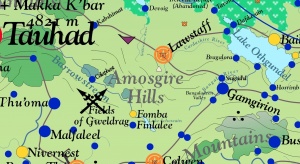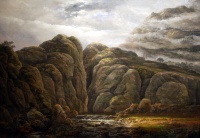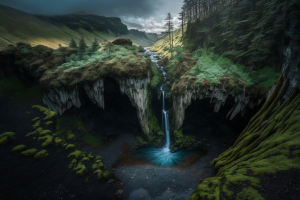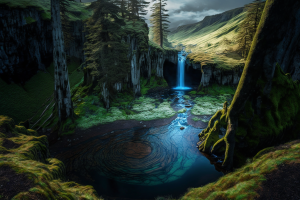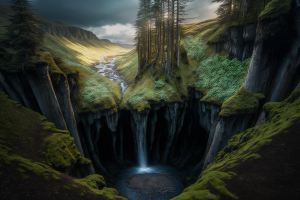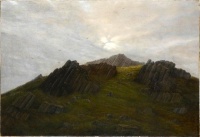Difference between revisions of "Amosgire"
Trismegistus (talk | contribs) |
Trismegistus (talk | contribs) m (→Lawstaff) |
||
| Line 38: | Line 38: | ||
==Lawstaff== | ==Lawstaff== | ||
| − | Lawstaff was founded sometime after the liberation of the Amosgire in the [[Isbajath of the High Magdalans]]. Lawstaff is the seat of the margravial government in the [[Empire of Magdala]]. The Margrave appoints and installs the Mayor of Lawstaff. population (2045 AI) 3,500. | + | Lawstaff was founded sometime after the liberation of the Amosgire in the [[Isbajath of the High Magdalans]]. Lawstaff is the seat of the margravial government in the [[Empire of Magdala]]. The Margrave appoints and installs the Mayor of Lawstaff. population (2045 AI) 3,500. A traditional community of [[Paimbalans]] inhabit a neighborhood of Lawstaff. |
==Fomba== | ==Fomba== | ||
Revision as of 01:57, 19 February 2023
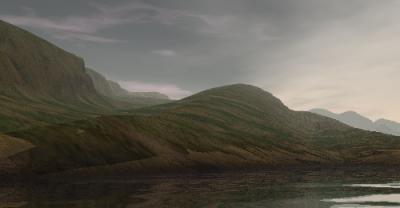
The Amosgire is a sparsely populated hinterland, infamous for hauntings throughout history and well-known as a place of refuge for the strange and criminal. The earliest legends of the Moigthe report that it is haunted and what is known of the giants’ memory reports likewise. The Neptultchi called it the place of the stone spirits and believed their god of the underworld, Qetmektli, made his abode there. The word Amosgire is pronounced /'Amuh-zhire/ [aməʒaɪr].
Landform
Karst or alvar hills with little to sparse vegetation, limestone plain. There are many hills, cliffs, and caves. Limestone ‘pavements’. Grykes (crevices), The landforms are similar to the Burren (flat areas of limestone ‘pavements’ with grass-filled cracks) and also different. Other parts of the Amosgire have cliffs, rocky outcroppings, and many, many hills of limestone. There are many cave entrances and limestone springs on the sides of small cliffs and steep hills. Underground rivers and streams abound with small cave mouths. In some stretches, there are very, very few trees and only very sparse shrubs. In other areas, there are copses of pine trees. Sinkholes are common with occasional cenotes--great circular depressions with steep walls. In the past, the largest of these cenotes [cf. Neptultchi, 'kumpu'] have been used as harbors to hold pirate skycraft that are not visible from the surface, unless one is looking directly into them from the edge. They are too far from the orbits of the Medibgóëse Skynesses to be viewed in any detail.
Sinkholes
In addition to karst formations, the Amosgire is infamous for certain areas with numerous sinkholes. These sinkholes have been the habitation in the past to fishfolk and other dire creatures known to prey upon humans, halflings, dwarves, and other humanlikes. The sinkholes are thought to have been largely cleared out during the Isbajutha, but were previously also the lairs of chaos priests and chaos worshipers. Today, the sinkholes are generally left alone, but some Tuadbe consider them sacred to their indigenous practices.
Climate and Phenomena
The Amosgire is prone to long spells of cold rain mingled with light snow in the winter and insidious pockets of fog impenetrable to sight. In the summer, spontaneous thunderstorms bring short downpours of rain. Naturally occurring fields of magical energy cause mirage-like illusions. Flickers of emergent magical energy resemble mirrors flashing in the distance. The lively panstream as manifested in the Amosgire is subject of an ongoing study and debate among scholars. Recent work by a collaborative team of researchers from the Heliotheological School of Amyrn and the Titancraft Guild School of Tauhad, employing titancraft instruments, has measured the panstream in the Amosgire and compared the readings to those measured near the Great Mage Dearth, but the findings have not yet been published.
Government
The local prince is the Margrave of the Amosgire who rules in absentee. The Margrave is Gaffilain Greahon. Some of his subjects are pleased with his arrangement, some are disgruntled, and most are indifferent.
Towns and Villages of the Amosgire
There are a few settlements in the Amosgire and they are limited to the outskirts. This is partly due to well-established supersitions and the relative poverty of the land. Grazing cattle and sheep are the only firm livelihood where it is done at all. Crop farming is impossible to do on any profitable scale. The Margrave maintains a small core of professional rangers who survey the land.
- Lawstaff (Margravial Seat of Government)
- Fomba (Imperial charter)
- Finlalee
- Calaphast
- Tavergogel
Lawstaff
Lawstaff was founded sometime after the liberation of the Amosgire in the Isbajath of the High Magdalans. Lawstaff is the seat of the margravial government in the Empire of Magdala. The Margrave appoints and installs the Mayor of Lawstaff. population (2045 AI) 3,500. A traditional community of Paimbalans inhabit a neighborhood of Lawstaff.
Fomba
Imperial Charter city. Ruled by council of mages, incarnandist notables, the local corpus merx, and representatives of the Sovereign Archguild of Master Titancrafters of Pytharnia. 8,500
Finlalee
Mayor installed by Margrave. population 1,500
Calaphast
Mayor installed by Margrave, subject to approval by city council. (ca 2745 AI) population: 4,500. Calaphast rests on the north shore of the Barrowstream River that flows from the Ithradic Mountains into Lake Ichowain, the largest body of water in the Amosgire.
Sites
The Amosgire has a reputation for being haunted. In eastern Amosgire may be found the tombs of the ancient Amosgirt heroes who helped defeat the Neptultchi and the Kemerite Giants. The haunted place of battle, the Field of Gweldrags also lies in the Amosgire. Recently, bandits have made their camp near the Glumspire Caverns, doubtless relying on the dark reputation of the country to their advantage. Stone grave monuments of the Amosgirts lie in eastern Amosgire. Other occupants of the Amosgire include the Fishfolk and some lizardfolk families.
Tombs of the Amosgirts
The Amosgirts were a demi-mortal race that dwelt in southern Pytharnia, especially the Amosgire. Their tombs may be found in eastern Amosgire.
Fields of Gweldrag
The Fields of Gweldrag is a stretch of land within the March of Amosgire known for its ghostly hauntings, particularly of ancient Yophenthean Legionaries. The site was one of the greatest defeats of the Yophenthean Military in ancient times. Travelers to the area report seeing luminous figures in ancient legionary armor marching across the lands, sometimes within arm's reach, sometimes on the horizon. These figures usually do not respond to any words or gestures of mortals, but on occasion will reply briefly to words spoken in Classical Yophenthean.
Languages
The local human language is the Aboskari Dialect of the Gonfalese Language.
Sources
- Account of Early Gonfalese Settlement, Hespeich borna Nasfffa of Blamffa, 2632
- Concordance of Spectral Phenomena of the Amosgire, Heikumbadd umb'Aínb of Malfaleel, 2687
- Tales of the Haunted Hills of Amosgire, Svygdraig borna Medibffalwyrg, 2523
See Also
| This article is a stub. It requires further development by the creator. |
